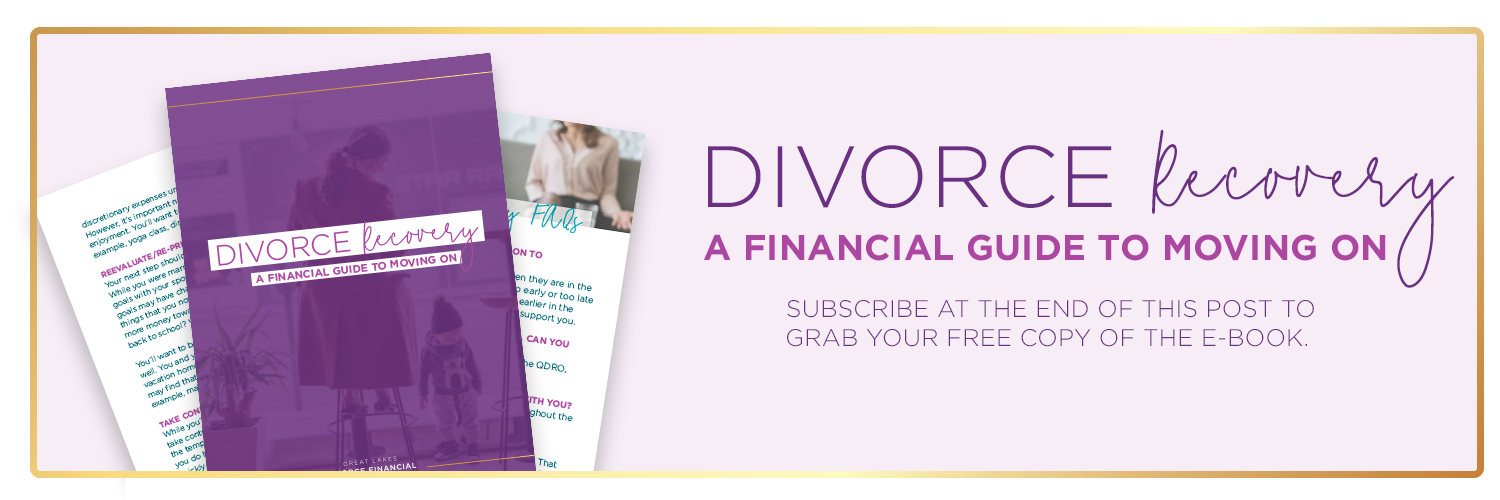Why Estate Planning After Divorce is a Must

Divorce is anything but easy. Some emotional or financial issues will be more challenging to overcome than others, yet every challenge has a solution.
As you work your way through a checklist of items to deal with during the divorce process, you’ll have lots to consider, from who gets what to your new living arrangements and custody of minor children. You’ll also be working through some financial planning for life after divorce.
A critical piece of your new financial plan is your estate plan. Whether you already have a will, trust, and other legal estate paperwork, or only a bank account and no estate planning documents at all, we’ll walk you through the essential items you need to address at the end of your marriage.
Note: Before finalizing any estate planning documents, ensure you are not violating any terms of your divorce judgment, i.e., property settlement agreement or life insurance policy requirements.
Estate Planning After Divorce is Critical
Estate planning is vital for everyone, but after a divorce, it can become even more crucial. As a now solo adult, you have some critical questions to address.
- Who can take care of you and your property if you become incapacitated due to a significant illness or accident?
- What happens to your minor children if you should suffer an early death?
- How do you want your property and possessions distributed when you pass away?
Once you have a handle on answering these tough questions, you need to turn your attention to the required paperwork to make your decisions and wishes known.
Start With the Beneficiary Forms
Many assets pass to others upon your death through a beneficiary designation. Married couples often name their spouse as a primary beneficiary, so updating named beneficiaries on bank and investments accounts and life insurance policies when your marital status changes is something to tackle asap.
When you’re adding new beneficiaries, save yourself time by having necessary information for each person on hand – full name, date of birth, address, and Social Security number. You should also figure out the percentage of benefit you want to assign co-beneficiaries and contingent beneficiaries.
Keep in mind; you may want to avoid naming minor children as beneficiaries. Otherwise, you need to also make sure you name a financial guardian to oversee these assets until they reach legal age. Without a financial guardian appointed by you in your will, the courts may assign this responsibility to your ex-spouse.
You’ll likely be asked for a copy of your divorce agreement, so be prepared for that as well.
Retirement accounts. You can contact your plan administrator for directions on how to change beneficiary designations on workplace retirement accounts. But you may also have the option to log into your account online and update beneficiaries electronically.
Assets with Payable-On-Death (POD) or Transfer-On-Death (TOD) Beneficiaries. You may be able to access your bank, brokerage, and other financial or investment accounts online and change or add Payable-on-Death (POD) or Transfer-on-Death (TOD) appointed beneficiaries. If your bank has a local branch, you can always stop by and revise your beneficiaries in person too.
A trip to the Department of Motor Vehicles may be necessary to amend a TOD beneficiary designation for your car. Consider speaking with an attorney about changing a TOD beneficiary on real estate property deeds to ensure it’s done correctly.
Life insurance. Changing the beneficiary of a life insurance policy requires you to contact your insurer and complete a change of beneficiary form. Consider adding contingent or final beneficiaries if you haven’t done so already.
Life insurance companies won’t pay death benefits directly to minor children. So, talk to your attorney about options to protect their financial interests. When your kids become adults, you may decide to make them primary beneficiaries and assign them a percentage of the insurance payout.
Beneficiary forms trump what’s written in a will, so you must update these forms to ensure the assets go to those you want to receive them.
Tackle Estate Plan Documents Next
If you don’t have any parts of an estate plan in place, it’s time to change that. Even if you think you have no assets to protect or you’re too young and healthy to consider retirement, let alone end-of-life and death decisions, schedule time for estate planning on your calendar.
The Essentials
Everyone over the age of 18 should have an advance health care directive and a financial power of attorney at a minimum. These documents allow you to name someone to make medical and financial decisions for you if you become legally incapacitated (unable to make decisions for yourself).
Anyone with minor children and those with property or possessions without a beneficiary designation should also have a last will and testament.
Put any of those missing documents at the top of your to-do list to protect yourself and your kids. Without them, your wishes may remain unknown or not followed.
Consider a Trust
Another estate planning tool to think about adding to your estate plan is a trust. A testamentary trust is added to your will and becomes effective upon your death. A revocable living trust is separate from your will and is in effect at creation.
Those using revocable trusts do so to establish provisions specifying when (and if) a child receives assets left for them. Through this trust, you can appoint a person (trustee) to oversee those assets until the child comes of age.
When using a revocable living trust, the trust holds your property, but you keep the right to amend or end the trust as long as you’re alive and mentally competent.
On the other hand, an irrevocable trust would mean you give up all ownership rights to the property placed in it. Thus, a testamentary trust in a will is considered irrevocable because it’s not in effect until after you pass.
Estate Planning After Divorce When Estate Plan Documents Already Exist
For those with existing documents, make updating them (and creating any missing ones) a priority.
Chances are your ex-, or soon-to-be-divorced spouse is named your health care proxy and personal representative. But it’s not likely you still want them making your future financial or health care decisions, or receiving your family heirlooms.
While it’s true, some states have laws to protect your estate from an ex-spouse after your divorce is final, not all do, and you don’t want to rely on those that exist as laws change.
There are several elements of an existing estate plan that will need updating once your divorce decree is signed.
It isn’t necessary to use an attorney to amend beneficiary designations or parts of your advance health care directive. But making changes does require you to be organized, take action, and keep records of the revisions you make.
Living Will
If you want to make changes to your living will to update your preferences for end-of-life care, you can do so without an attorney’s help. You can find advance directives online or contact your doctor or local hospital to get a blank copy that follows your state’s laws. An estate attorney may be best when you want to make changes to your medical power of attorney.
Use an Attorney to Update These Documents
In general, it’s not a good idea to try to update the following estate planning documents without the help of an attorney. While many online providers offer forms, they might not comply with your state’s laws or address complex circumstances resulting from your divorce.
Errors in your paperwork can result in unintended distributions of your assets. They might also result in someone contesting your will. Here’s some paperwork you should get help from an attorney to update.
Durable powers of attorney
If you try to update a financial or health care power of attorney on your own, you might end up granting more authority to your agent than you want. In some cases, a durable power of attorney with errors may be disregarded by banks and health care providers, forcing your loved ones to go through a guardianship process.
Last Will & Testament
To change your will, you can either amend it with a codicil or write a new will. If changes are minor, a codicil can do the trick. However, after your divorce settlement, there are likely several changes you’ll need to make to your will. Writing multiple amendments can confuse others and lead to potential will contests.
In this case, the better choice is to revoke your old will, destroy it, and create a new will, which is something you’ll likely want to do with the help of an estate planning attorney.
A lawyer can review everything and write your new will in a way that follows your state’s laws and addresses any property settlement agreements from your divorce. This can help you avoid potential challenges or the possibility that your will might be declared invalid by the probate court.
Living trust
If you have a living trust, you should avoid changing any trust documents without the help of an attorney. Trusts are complex, and your lawyer should review any proposed changes. An attorney can help you make the revisions you need, so protecting trust assets continues in the manner you intend.
Estate Planning and Divorce
Neither estate planning nor divorce is a fun topic. But when addressing one, you need to acknowledge the other to ensure you’re protecting yourself and your loved ones.
One of the most important things you can do post-divorce is creating or updating the essential estate planning documents – advance health care directive (living will/medical power of attorney), financial power of attorney, and a last will and testament. And consider a trust if you have minor children or a complex estate.
Finally, someday you may find yourself entering marriage again. At that time, it will be beneficial to consider adding a prenuptial agreement to your estate plan. Prenups can be especially helpful when you and your new spouse have children from prior relationships to ensure all parties are protected.
_______________________________
Bio: Vicki Cook and Amy Blacklock are coauthors of Estate Planning 101 and cofounders of the award-winning personal finance website Women Who Money. Vicki’s also the founder and blogger behind Make Smarter Decisions, and Amy’s the founder and blogger behind the award-winning site Life Zemplified. Additionally, they’ve been frequent contributors to GOBankingRates, Wealthfit, Medi-Share, and various personal finance sites around the web.



